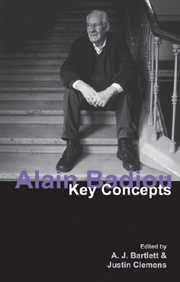Book contents
- Frontmatter
- Contents
- Contributors
- Acknowledgements
- Abbreviations
- Miscellaneous Frontmatter
- Introduction: Badiou's form
- 1 Biography and early works
- PART I THE FOUNDATIONS OF BADIOU'S THOUGHT
- 2 Philosophy
- 3 The conditions
- 4 The subject
- 5 Ontology
- PART II BADIOU'S KEY CONCEPTS OR “CONDITIONS”
- PART III BADIOU'S ENGAGEMENT WITH KEY PHILOSOPHERS
- Afterword: Badiou's futures
- Bibliography
- Index
4 - The subject
from PART I - THE FOUNDATIONS OF BADIOU'S THOUGHT
- Frontmatter
- Contents
- Contributors
- Acknowledgements
- Abbreviations
- Miscellaneous Frontmatter
- Introduction: Badiou's form
- 1 Biography and early works
- PART I THE FOUNDATIONS OF BADIOU'S THOUGHT
- 2 Philosophy
- 3 The conditions
- 4 The subject
- 5 Ontology
- PART II BADIOU'S KEY CONCEPTS OR “CONDITIONS”
- PART III BADIOU'S ENGAGEMENT WITH KEY PHILOSOPHERS
- Afterword: Badiou's futures
- Bibliography
- Index
Summary
References and differences
Throughout his work Alain Badiou underlines both the centrality of the notion of subject, and the fact that a subject is neither a specific type of substance, nor the name for the higher functions of human cognition, nor a set of universal conditions a priori of experience.
For Badiou, “a subject is not a substance” (OS 26). Against any materialist reduction, a subject cannot be identified with the human animal. And against sociological reduction, it cannot be identified with a “social individual”, with an individual component of a given mode of organization of the collectivity (e.g. the subject of the state, or the subject to power). The subject is therefore not a res extensa, an object of a situation. But it cannot also be identified with the res cogitans: if Badiou somehow identifies the subject with a position (the “empty” position from which one thinks), at the same time he refuses to define it, along with Descartes, as a substance. A subject, in other words, is not a “given”, a datum, that exists independently of the material contingencies of the situation, but is an operation that might or might not appear, an operation the existence of which is not necessarily embedded in the simple existence of a human being.
At the same time, Badiou does not follow the Kantian idea of the subject as “condition of possibility of experience”. “A subject is in no sense the organising of a meaning of experience. It is not a transcendental function” (OS 26): similarly to Deleuze (1990: 14th and 15th series), for Badiou a transcendental function is nothing but the sublation to the status of universally valid a priori of our contingent, recurrent modes of relation with the world.
- Type
- Chapter
- Information
- Alain BadiouKey Concepts, pp. 38 - 47Publisher: Acumen PublishingPrint publication year: 2010
- 4
- Cited by



